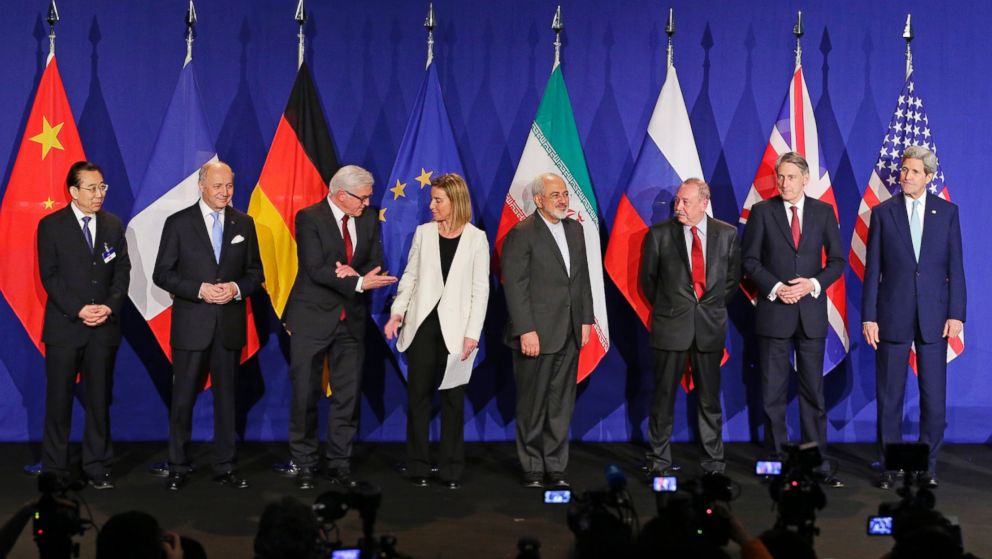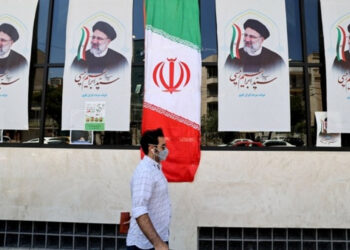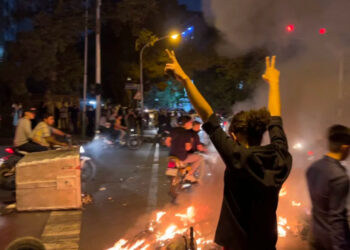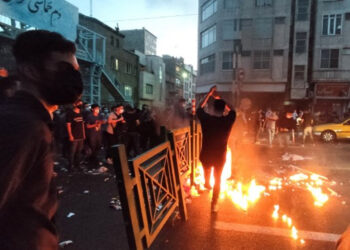Speaking to the Iranian parliament, the Majles, on August 15, President Hassan Rouhani said the latest round of U.S. sanctions violates the Joint Comprehensive Plan of Action, the nuclear deal concluded in 2015.
Western media outlets mostly reported Mr. Rouhani’s words as a threat or warning that Iran could pull out of the nuclear deal within hours if the U.S. continues to sanction Iranian officials and entities.
But experts told The Globe Post that neither Iran nor the U.S. are likely to rip up the nuclear deal, which is an agreement between the two countries and the rest of the P5+1 group – China, France, Germany, Russia and the United Kingdom – along with the European Union.
Ariane Tabatabai, a nonresident senior associate at the Center for Strategic and International Studies, translated Mr. Rouhani’s full statement.
“Those who for months spoke about tearing up the JCPOA have recently started to accuse Iran of violating its spirit despite seven IAEA reports, which have confirmed Iran’s complete implementation of the deal. Because they have been advised by their advisers that [should they leave the agreement] they’d be isolated on the international stage,” Mr. Rouhani said.
Mr. Rouhani added: “New U.S. officials should know that failed experience of sanctions and coercion brought their previous governments to the negotiating table.”
“And if they want to return to that experience, surely, in a short amount of time, not in a period of weeks and months, but hours and days we will return to a much more advanced situation that at the time of the start of the talks.”
The JCPOA deals with Tehran’s nuclear program only: In exchange for strict IAEA monitoring, the dismantling of centrifuges and shipping of enriched uranium to Russia, along with other measures, the P5+1 agreed to lift nuclear-related sanctions.
The deal doesn’t cover other U.S., E.U. or U.N. sanctions, such as those against Iran’s ballistics program, which Washington maintains violates a 2010 U.N. Security Council resolution.
Tehran disputes that allegation. Foreign Minister Javad Zarif recently said the tests are in compliance with the resolution because the missiles are not designed to deliver a nuclear payload.
Some have speculated that President Donald J. Trump’s endgame is to use ballistics and terrorism sanctions to force Tehran to walk away from the nuclear agreement.
His administration, beginning with State Department spokesperson Heather Nauert last month, has also said Iran’s ballistics tests are violating the spirit of the JCPOA, potentially paving the way for additional sanctions.
A State Department official told The Globe Post that Iran’s “continued malign activities outside the nuclear issue severely undermine the stated goal of the JCPOA nuclear deal to contribute to ‘regional and international peace and security.’”
The official said the United States will continue to “aggressively counter Iran’s malign activities in the region” and hold Tehran strictly accountable to the JCPOA requirements even as it reviews the deal.
Dr. Jim Walsh, a Research Associate at the Massachusetts Institute of Technology’s Security Studies Program (SSP), told The Globe Post that the United States is more likely than Iran to pull out of the JCPOA.
“The Iranians are angry and unsettled, but they’re not going to be the ones to pull the trigger here. They’re going to let the U.S. do that and then blame the U.S.”
He noted that Mr. Trump has stated his opposition to the JCPOA and, although Secretary of State Rex Tillerson and National Security Advisor H.R. McMaster have counseled him to recertify Iran’s compliance with the deal, Mr. Trump has ignored his advisors before in pulling out of the Paris climate agreement.
Muhammad Sahimi, N.I.O.C. Chair in Petroleum Engineering and Professor of Chemical Engineering and Materials Science at the University of Southern California, told The Globe Post that Mr. Rouhani’s administration is not likely to leave the JCPOA as long as the E.U. parties, particularly France, Britain, and Germany, uphold their part of the deal.
Mr. Sahimi predicted that Iran will be committed to its obligations as long as its relations with the E.U. improves.
“We must remember that since 1980 Iran has been sanctioned by the United States for various reasons and various intensity, and so being sanctioned by the U.S. is not new to Iran,” he said.
The JCPOA has never gone smoothly. It doesn’t carry the weight of an international treaty, and Republicans (and some Democrats) in the U.S. Congress have fought it at every step, beginning with attempts to keep it from coming into force, and then with legislation to prevent Iran from being allowed access to U.S. dollars.
Republicans also introduced a bill to try to prevent the Obama administration from buying nuclear material from Iran after it was revealed in April 2016 that the Energy Department planned to purchase 32 tonnes of heavy water, which is used in nuclear reactors.
John Kerry’s State Department was forced to explain that the purchase was done to ensure Tehran’s compliance with the deal. Iran was having difficulty finding a buyer for the material, which is limited to 130 tonnes under the nuclear deal.
Despite the lifting of sanctions and Treasury Department guidance to other countries, Iran still struggled to find partners in the world market for heavy water as well as general trade.
Even multinational companies in the E.U., which is a party to the JCPOA, reported being unsure of whether making deals with Tehran would subject them to U.S. secondary sanctions.
Mr. Walsh said Iran could continue to have trade and other relationships with Europe (as well as Russia and China) even if the U.S. excludes itself from the deal.
Mr. Trump condemned the JCPOA constantly throughout the 2016 election campaign, calling it the worst deal ever negotiated, repeating false claims about money Tehran was getting, and pledging to dismantle it as soon as he got into office.
His new administration didn’t waste time undoing Mr. Obama’s diplomatic overtures. On February 3 the Treasury Department issued a new round of sanctions targeting Iran’s ballistic missile program. A second set followed in May and two more in July.
The Obama administration had also sanctioned Iranian nationals involved in the ballistics program, even after the nuclear agreement came into force, but Mr. Trump made it clear that the White House and the State Department under his tenure would push Iran harder.
In March, Mr. Trump ordered his Secretary of State to review whether the U.S. complying with the JCPOA was in the country’s national interest, a suggestion that the administration may be trying to pull out of the deal while trying not to infuriate its estranged European allies.
U.N. Ambassador Nikki Haley is set to travel to Vienna next week to push the IAEA on Tehran’s compliance with the deal, Al-Monitor’s Laura Rozen reported on Friday.
The context of Mr. Rouhani’s comments on Tuesday matter as well.
Both Iran and the U.S. were largely able to sell the deal at home as part of a thawing of relations and by stressing that it was not perfect, but the best agreement possible at the time.
Since then, the U.S. administration has rolled over to one that is aligned with the Republicans’ desire to undercut or end the deal. The Trump administration has pivoted back toward Saudi Arabia and the Gulf, as well as Israel.
Mr. Rouhani was also speaking to the Majles ahead of the MPs’ approval of his cabinet picks, and Mr. Sahimi noted that the moderate Rouhani is under pressure domestically from hardliners in his own government.
“But, a lot of that pressure is rhetorical and Rouhani can resist them by pointing out the economic growth and by simply pointing out that it was the Supreme Leader, Ayatollah Ali Khamenei, who gave the final approval to the agreement,” he explained.
Mr. Walsh said Rouhani’s comments were sensible from someone in his position.
“From where he’s standing it’s a sensible set of tactics to use,” he said. “If you are Rouhani, it is in your political interest to signal a tough stance,” both to silence hardliners at home but also to put the Europeans on notice.
Mr. Rouhani was saying “you better save this agree nt, because it’s going to get ugly afterwards,” Mr. Walsh explained.
“I think Iran’s president and foreign minister are not shopping for ways to get out of the agreement or for the agreement to fail,” Mr. Walsh said. “They’re not going to do the U.S. any favors by causing the collapse of the agreement.
Tehran has also accused the U.S. of violating the deal, specifically of not delivering on its promises.
Mr. Sahimi noted that “E.U. commitment will help Rouhani to deliver some economic growth, and also deepen the fissures between the E.U. and the United States.”
Mr. Walsh said Germany, France and the rest of the E.U. would be unlikely to allow Washington to punish European firms with sanctions if Mr. Trump pulls out of the deal.
“If you’re imposing aggressive sanctions against your allies – that’s what we’re talking about here – then that raises some real questions,” he added.
On Sunday, the Majles approved $1 billion in new spending for the ballistics program and the Iranian Revolutionary Guard Corps, which are also under U.S. sanctions.
Despite the rhetoric on both sides, Iran has complied with the terms of the deal, a fact the State Department reaffirmed again last month. The IAEA has also affirmed seven times since implementation day on January 16, 2016, that Tehran is upholding its end of the agreement.
Mr. Walsh noted that even if Mr. Trump does announce he’s pulling out of the deal, he could only take steps to formally withdrawal.
“As with some other things that he’s done, he might tweet that they’re pulling out, and then there’s a question of what does that mean … and there might be some gap between making an announcement and then doing things that formally lead to leaving the agreement.”




















